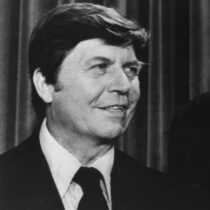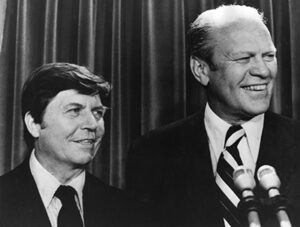News Stories

An Act of Conscience
Jerald F. terHorst was President Ford’s press secretary for a scant matter of weeks. He handed in his resignation after Ford issued a pardon to Richard Nixon, but his collection indicates there’s more to the story than just a political disagreement.
by Lara Zielin
“It feels like someone threw open the window of the White House to let in light and air.”
These were the words of White House press corps member Peter Lisagor after Gerald Ford became president of the United States in 1974 and, as his first official act as president, appointed Jerald F. terHorst as press secretary.
Like Ford, terHorst was a University of Michigan graduate (class of 1946) who had served in World War II. He’d been a reporter for the Grand Rapids Press and Detroit News, even covering Ford’s first congressional campaign in 1948. In 1961, he became the Washington Bureau Chief for the Detroit News until Ford picked him for press secretary.
Ford said he believed in “the First Amendment and the absolute necessity of the free press,” and appointed terHorst after the Nixon administration had treated the press as the enemy. Tom Brokaw of NBC said it was “like New Year’s Day.”

President Gerald Ford (right) and then press secretary Jerald F terHorst (left) in 1974. Image credit: Alamy Photos.
But the elation was short-lived.
Just one short month later, terHorst would be gone. He handed in his resignation letter on September 8, 1974, after Ford issued a pardon to Richard Nixon.
His resignation letter, archived at the Bentley Historical Library in the Jerald F. terHorst collection, is straight to the point:
Pursuant to our conversation and my personal letter to you, I hereby resign as your Press Secretary, effective today.
In a longer and more personal version of terHorst’s letter, archived at the Ford Presidential Library in Grand Rapids, Michigan, terHorst writes that he could not “credibly defend” Nixon’s pardon and calls this the “most difficult decision I ever have had to make.”
News clippings archived in the Bentley’s terHorst collection suggest that terHorst’s resignation went beyond a moral dispute over the pardon.
According to an undated news clipping from terHorst’s collection, White House aides lied to terHorst and told him that Ford wasn’t going to pardon Nixon. terHorst in turn told the press that no pardon was on the table. When that information turned out to be false, terHorst had to apologize to members of the press. He lost credibility with his peers and felt undermined by Ford.
In 1975, terHorst received the inaugural Conscience-in-Justice Award from the American Society of Journalists and Authors. He resumed work as a reporter until 1981, when he worked for the Ford Motor Company as their director of public affairs in Washington, D.C.
terHorst died in March 2010. In his obituary, the New York Times called his resignation “a rare act of conscience by a high-ranking public official.”
The Jerald F. terHorst papers at the Bentley Historical Library are open to the public.
